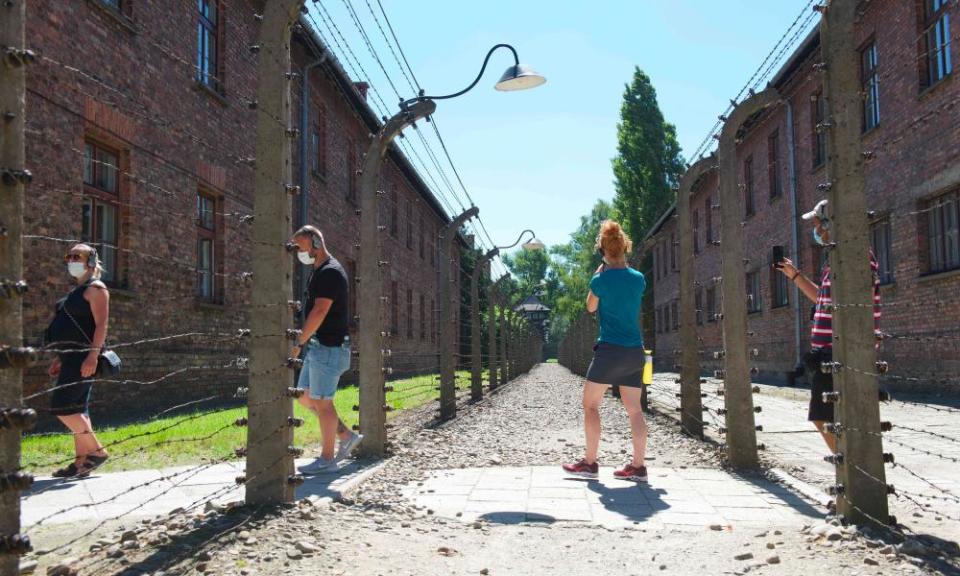Holocaust stories must be told, but their popularity is deeply uncomfortable

As trends go, the Holocaust is perhaps not what you might think of as a “must-have” subject for books today. But check out the bestseller lists and you’ll see plenty of novels and biographies with Auschwitz in the title. It’s an inescapable, uncomfortable fact: the Holocaust is currently trendy.
Humans have always been fascinated by the macabre. A couple of hundred years ago, people would flock to watch public hangings. Today, you can go on Jack the Ripper tours. True crime documentaries and blockbuster movies are littered with brutality and violence.
Personally, I watch the violent bits through my hands and I can’t bear horror films. As an author, I’ve built my reputation writing books featuring mermaids and fairies and time travel and pirate dogs.
And now I’ve written about the Holocaust, in a novel inspired by my dad’s escape from Nazi-occupied Austria. While the idea had been simmering in the background for a decade, my novel seems to be coming out at a time when appetite for such stories is high.
It’s a strange thing. Holocaust deniers are out there in growing numbers, so keeping alive the truth is as important as ever. On the other hand, I can’t help feeling a little discomfort and questioning what it is that people are looking for when they choose these books, watch these films or even visit the sites of such atrocities.
In 2019, I set off in a van with my wife on the most difficult research trip I’ve ever made. We visited concentration camps, museums and synagogues in five countries across Europe, delving into the heart of the Nazi era. Each concentration camp broke me a little bit more. At Dachau, I felt an overwhelming sense of grief. At Mauthausen, I felt rage as I looked out across the fields where the SS used to invite local people to play football, in between murder and torture.
But it was Auschwitz-Birkenau that crept under my skin and refused to leave. Standing on the dusty road at the end of the train tracks at Birkenau and walking to the buildings where, at its height, 12,000 people a day were murdered in the gas chambers, was the most sobering thing I’ve ever done.
“Just living here would have been like being in a car crash every single day,” our tour guide told us as he led us along the corridors, nimbly avoiding other guides heading the opposite way.
As I stood looking at the shooting wall where Jews and other victims of the Nazi regime were routinely murdered, trying to cope with my feelings of despair, I realised someone was watching me. It was a mother waiting for me to move so she could take a photo of her daughter in front of the wall. I stumbled away, numb.
In the gas chambers, my wife struggled to contain her emotions – and then she spotted someone taking a selfie.
Did these people not realise they were trampling on the memories of those who had perished in these terrible places? Or were they somehow able to separate themselves from true horrors, treating history as a movie designed to shock and excite in equal measure?
Thankfully, most people treated the experience with the respect it deserved. But it was still hard to stomach the idea of such places being on the tourist trail. In the end, we have to accept that we’re 80 years on from these events. Some people find it hard to connect with them beyond a day out. And despite the selfies and the posing, I’m grateful that these truths are still being told. It is up to all of us, as individuals, to honour those who perished in these terrible places in the best ways we can.
I’m not religious, but we lit a candle and said a prayer at each concentration camp. When I found my great aunt’s name in the book of Jews murdered at Auschwitz, we said Kaddish for her. We remembered and we honoured in our small way.
And I try to shrug off my discomfort at something so terrible being popular and instead welcome it as a chance to share my family’s story, a message of hope, friendship and connection. Because right now, we need those things more than ever.
When the World Was Ours by Liz Kessler is out now (hardback, Simon & Schuster Children’s Books).

 Yahoo Finance
Yahoo Finance 